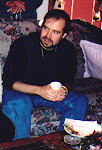My grandmother Ruth died early Saturday morning after a battle with cancer. As I posted a few weeks ago, I thought a lot of my grandmother and will miss her very much.
Her death, however, was more a relief, which feels wrong to say, so allow me to explain. This was my first adult experience with such a circumstance and I didn't know what to expect when she was diagnosed with cancer more than nine months ago. It feels wrong to say, but her battle with cancer had become so uncomfortable (and obviously so hopeless for recovery), that I even wished for her death on her behalf. She wanted it to end and said so when she could.
I used to wonder if I was robbed of my chance to say goodbye to my father, who was taken from us unexpectedly and instantly. But, after now experiencing the sadness of a prolonged and very uncomfortable and slow regression before death, I can honestly say that neither is preferable. Considering its an inevitability, preference might be the wrong word, but I think you get my meaning.
The end result remains the same because we all miss her and hate to lose her from our lives. However, because her fate was mapped out for us to see, my family has been more able to turn the expected end into a celebration of her life. I think the reason is that the actual loss was confronted as we came to accept the inevitable.
She is already sorely missed, and her influence in our lives has never been more deeply felt.
BOOK UPDATES
-- I've just finished "The World Without Us" by Alan Weisman. It's a great book about what would happen to the world if humans disappeared overnight. It is an "imaginative" non-fiction in that it contemplates a hypothetical based on scientific facts. Very well done. It's just so interesting.
My reaction was more pronounced toward the delicate balance we walk even WITH us here. For example, our use of nuclear energy (even non-bomb atomic energy) produces some extremely nasty stuff and our disposal methods leave much to be desired. The book explains what happens to those materials and how they would escape, but it also illustrates how fine a line exists between "containment" of radioactive waste and "rampant cancer-causing plumes stretching for miles around."
Most unnerving is how plastics accumulate. The chain reactions that result from the most seemingly-mundane things (like plastic toys) are just plain bothersome. It's a real cringe-inducing experience. Try googling "North Pacific Gyre" sometime if you want specifics. (Hint: it's where our trash accumulates in the ocean.)
Also, after reading this book, I will not be living in Manhattan. Ever. Apparently 700+ pumps (many pumping against gravity) are all that separates that huge city from being a marsh. Big trouble can happen within an hour of loss of power. Yikes.
-- I finished my "epic" book of the year, "Bearing the Cross" by David Garrow. Amazing look at MLK and the civil rights movement. The turmoil, the hurdles, and the courage displayed were all painstakingly broken down.
I've said it before, but MLK, to me, is the greatest citizen this country has ever produced. King's deeds, more than any other personal experience or person I've known, inspire me toward spirituality. A reverend who took to the streets to assist in deed to eliminate the most shameful element of post-slavery America: Segregation.
Most illuminating were the lengths to which the government (even Kennedy) went to spy on King. He was a marked man, his every move was watched, and yet he was able to accomplish real change for the betterment of people. One of the best books I've read in a very long time.
Sunday, December 7, 2008
Subscribe to:
Comments (Atom)




